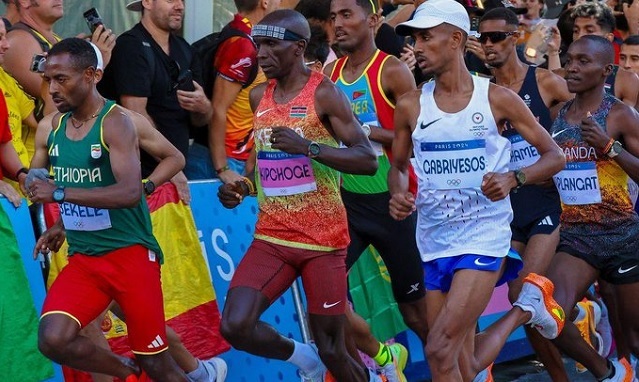
PARIS, FRANCE | Xinhua | Eliud Kipchoge, the marathon legend revered across the globe, walked into the mixed zone wearing only his shorts.
The sight of him – stripped of his usual running gear, without shoes, socks, or even a shirt – was as striking as it was symbolic. Less than an hour earlier, he had made the difficult decision to stop running in what might have been his final Olympic marathon.
The 39-year-old Kenyan, aiming to become the first man to win three Olympic marathon titles, started the race among the leaders. But he was already feeling the effects of a back injury that became too much to bear as he approached the 20km mark. Kipchoge, a man who has pushed through countless physical and mental barriers in his illustrious career, found himself unable to continue.
“I had a pain in my back and decided not to finish and try to get out,” Kipchoge explained later. “The hills didn’t affect me at all. The pain made me stop.”
The race that had started with so much promise for Kipchoge ended in a humbling walk through the streets of Paris. After stopping, he removed his running shoes and handed them to a fan before climbing into an official vehicle.
But before that, he walked two kilometers, flanked by supporters on both sides.
The crowd, recognizing the significance of the moment, began to ask for pieces of his kit. Kipchoge, ever the gentleman, obliged – until he had nothing left but his dark red lycra shorts.
“The other runners were telling me to push on but I was telling them, ‘No, I have pain, I can’t.’ I could feel the love and respect from them. I walked for 2km and had more than 300 people on either side of me walking with me. That’s why I don’t have my shirt, the socks, the shoes, the race number,” Kipchoge said.
It marked the first time in his fabled career that Kipchoge – widely regarded as the greatest marathon runner ever – failed to finish a race.
Kipchoge holds four of the 10 fastest marathon times in history, including his personal best of 2:01:09 set at the 2022 Berlin Marathon. He is also the only person to have ever completed a marathon in under two hours, a feat achieved in a controlled environment with pacers in 2019-a record not officially recognized but celebrated worldwide.
Despite the setback in Paris, Kipchoge’s legacy is secure. He has dominated the marathon distance like nobody before him and he now has the distinction of having competed in five Olympic Games.
“Today was a tough day at the office. You can train for a very long time but one day, it can happen,” the veteran said. “It’s like boxing. You can go to a training camp for five months and be knocked out in two seconds. But life will continue.”
Kipchoge is not the only long distance legend facing an uncertain future in the sport.
Ethiopia’s Kenenisa Bekele, who dominated the 5,000m and 10,000m events in his prime, also struggled in the marathon here, finishing in 39th place.
“People have been talking about me and Kipchoge, but you see it was the young generation today,” the 42-year-old said.
“These guys are stronger than us,” Bekele admitted, acknowledging the dawn of a new era in marathon running. “At around 15km my hamstring felt stretched, so I could not do any more after that. Even after 10km I was feeling the strain, so I knew I could not catch up with the leaders.”
Despite his struggles, Bekele expressed pride in the performance of compatriot Tamirat Tola, who broke the Olympic record to win the marathon gold.
“It is fantastic that Ethiopia won the race. He is very strong, and I am happy for him,” Bekele said.
As for Kipchoge, Paris 2024 will not necessarily mark the end of the road.
“I don’t want to comment on what will happen tomorrow. I want to try to evolve-if I don’t evolve, then I do other things,” he said. “I don’t know what my future will hold. I will think about it over the next three months. I still want to try to run some marathons.” ■
 The Independent Uganda: You get the Truth we Pay the Price
The Independent Uganda: You get the Truth we Pay the Price





